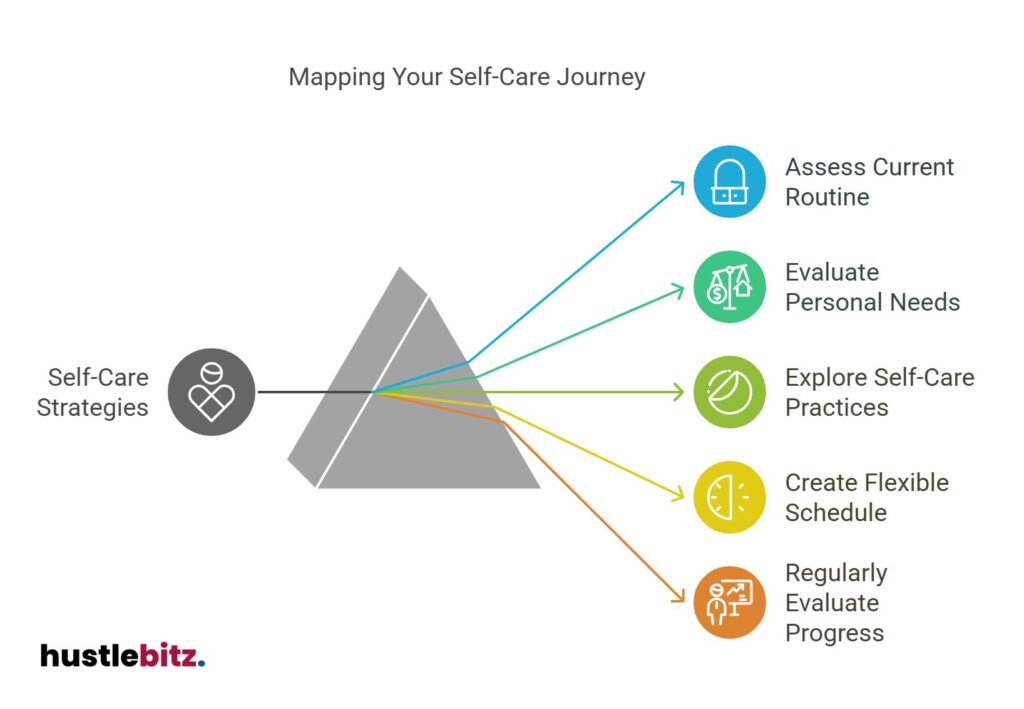Tailoring your personalized self-care routine is crucial for enhancing physical, mental, and emotional health. Begin by assessing your current practices and identifying specific needs, such as your energy levels or social interaction preferences. Incorporate a variety of self-care activities that resonate with you, ensuring a holistic approach. Create a realistic schedule that includes regular mindfulness techniques to foster emotional resilience. Finally, periodically evaluate your routine to ensure it aligns with your evolving goals. By understanding and adapting these components, you can cultivate a more fulfilling self-care experience that nurtures your well-being in a dynamic way. Insights for further enhancement await you.
Key Takeaways
- Assess your current routine by reflecting on daily activities to identify areas needing improvement for better well-being support.
- Evaluate your personal needs across physical, emotional, mental, and spiritual dimensions to inform effective self-care practices.
- Explore various self-care practices, such as physical exercise, emotional support, social connections, and spiritual activities, for a holistic approach.
- Create a flexible schedule that incorporates prioritized self-care activities, allowing for adjustments based on life’s unpredictability.
- Regularly evaluate your self-care progress through reflection, measurable goals, and feedback to ensure alignment with evolving needs.

Understanding Self-Care Basics
Self-care encompasses a range of activities and practices aimed at promoting physical, mental, and emotional well-being, ultimately fostering a healthier and more balanced lifestyle. Understanding the self-care basics is crucial for anyone looking to serve others effectively. By prioritizing your own needs, you can create a solid foundation from which to extend care and support to others.
To embark on this journey, the first step is to identify your needs. Consider what aspects of your life require attention, whether they are related to stress management, physical health, or emotional resilience. Taking time to reflect on your current state fosters awareness and helps you recognize areas for improvement.
Creating a personalized self-care plan is essential in this process. This plan should encompass a variety of self-care activities tailored to your unique preferences and lifestyle. Whether it includes mindfulness practices, physical exercise, creative pursuits, or social connections, the key is to ensure these activities resonate with you.
As you implement your personalized self-care plan, it is vital to evaluate its effectiveness regularly. This evaluation allows you to adapt your self-care activities as your needs evolve, ultimately contributing to your overall well-being.
Assessing Your Current Routine

Evaluating your current routine is essential for identifying areas that may require adjustment to better support your overall well-being. A well-structured self-care routine is not merely a sequence of activities; it is a thoughtful reflection of your personal needs and values.
To effectively assess your current routine, engage in self-reflection, taking the time to examine how each component contributes to your mental, emotional, and physical health.
Begin by documenting your daily practices and noting which elements leave you feeling rejuvenated and which may feel burdensome. Consider whether these activities are creating a personalized experience or if they merely reflect societal expectations. It is crucial to recognize that self-care is not a one-size-fits-all approach; what works for one person may not be suitable for another.
As you assess your current routine, contemplate the regular part of your day dedicated to self-care. Ask yourself if this time is sufficient and effective in meeting your needs. Are there activities that you feel compelled to include, yet they do not resonate with your genuine self? Identifying these discrepancies allows you to streamline your routine, ensuring that each action aligns with your personal goals and values.
Ultimately, by thoughtfully evaluating your current routine, you lay the groundwork for creating a personalized self-care strategy that not only nurtures you but also empowers you to serve others more effectively.
Identifying Personal Needs

Understanding your personal needs is a vital step in developing a self-care routine that genuinely reflects your values and enhances your well-being. When you take the time to identify personal needs, you lay the groundwork for effective self-care practices that align with your self-care goals. This process not only supports your emotional well-being but also empowers you to serve others more effectively.
To assist in identifying your personal needs, consider the following key areas:
- Physical Health: Assess your energy levels, sleep patterns, and nutrition. What physical activities rejuvenate you?
- Emotional Support: Reflect on your emotional landscape. Do you require more social interaction, or do you need time for solitude?
- Mental Clarity: Evaluate your cognitive needs. Are there hobbies or activities that stimulate your mind and promote relaxation?
- Spiritual Connection: Consider any spiritual practices that nurture your inner self. How do you find peace and purpose in your daily life?
Exploring Different Self-Care Practices
A diverse array of self-care practices can enhance overall well-being, offering tailored solutions that cater to individual preferences and needs. Understanding the various types of self-care is essential for developing an effective routine that not only nurtures oneself but also enables one to serve others more effectively. Self-care practices can be broadly categorized into physical, emotional, social, spiritual, and practical activities.
Physical self-care includes activities such as exercise, nutrition, and adequate sleep, all of which are foundational for maintaining energy levels and health.
Emotional self-care practices, on the other hand, focus on managing one’s feelings and developing emotional resilience. Engaging in hobbies, such as painting, gardening, or playing an instrument, can provide significant emotional relief and joy, fostering creativity and reducing stress.
Social self-care emphasizes the importance of connecting with others, whether through supportive relationships or community involvement.
Spiritual self-care involves practices that bring a sense of purpose and connection, such as meditation or volunteering, reinforcing the idea that serving others can be a profound source of personal fulfillment.
Creating a self-care plan that incorporates a blend of these activities and practices allows for a holistic approach to well-being. By exploring different self-care practices, individuals can discover what resonates with them, ultimately enhancing their capacity to contribute positively to the lives of those around them.
Adopting a personalized self-care routine not only nurtures personal growth but also amplifies one’s ability to serve others compassionately.
Creating a Schedule

Establishing a structured schedule is crucial for integrating self-care practices into daily life, ensuring that personal well-being remains a priority amidst various responsibilities.
A well-crafted self-care plan not only helps you manage time effectively but also empowers you to serve others better by maintaining your own wellness.
Creating a schedule allows you to systematically incorporate self-care into your daily routine, making it an indispensable aspect of your life.
To help you create a personalized self-care schedule, consider the following steps:
- Identify Your Priorities: Determine which self-care activities resonate most with you, such as exercise, reading, or meditation. This will guide your schedule creation.
- Set Specific Times: Allocate specific time slots for each self-care activity. Consistency is key—aim to integrate self-care practices into your daily routine at the same time each day.
- Be Realistic: Understand your weekly commitments and adjust your plan as needed. Avoid overloading your schedule to maintain a sustainable self-care practice.
- Review and Adapt: Periodically assess your self-care plan to ensure it aligns with your evolving needs. Life can be unpredictable, so remain flexible and willing to adjust your plan as needed.
Incorporating Mindfulness Techniques

Incorporating mindfulness techniques into your self-care routine enhances emotional resilience and fosters a deeper connection to the present moment. Mindfulness practices provide invaluable tools for individuals seeking to serve others by cultivating greater self-awareness and emotional stability, essential for effective caregiving.
To integrate mindfulness into your self-care routine, it is important to prioritize moments of stillness amidst the demands of daily life. Consider setting aside time daily or weekly for mindfulness exercises such as meditation, deep-breathing techniques, or mindful walking. These practices can serve as powerful forms of stress relief, allowing you to center your thoughts and emotions, ultimately leading to improved well-being.
Begin with simple techniques, such as practicing gratitude. Each day, take a moment to reflect on three things you are thankful for, enhancing your appreciation for the present. Another effective method is to engage in mindful eating. Focus on the texture, flavor, and aroma of your food, transforming mealtime into a sensory experience that draws you back to the present moment.
As you explore mindfulness practices, remember that consistency is key. Establish a routine that resonates with you, and approach each session with an open heart and mind. This dedication not only nurtures your emotional health but also empowers you to engage more fully and compassionately with those you serve.
Evaluating Your Progress

How can you effectively assess the impact of your personalized self-care routine on your overall well-being and personal growth? Evaluating your progress is essential in understanding how prioritizing self-care influences various areas of your life. This assessment allows you to make informed adjustments, ensuring that your self-care practices align with your evolving needs and aspirations.
To facilitate this evaluation, consider the following steps:
- Reflect Regularly: Set aside time each week or month to reflect on your self-care experiences. Journaling can be a powerful tool for documenting your thoughts and feelings regarding your routine.
- Set Measurable Goals: Establish specific, achievable goals related to your self-care practices. By defining what success looks like, you can objectively assess whether you are making progress.
- Seek Feedback: Engage with trusted friends, family, or mentors who can provide constructive feedback on your self-care journey. Their perspectives may illuminate areas for improvement that you might have overlooked.
- Adjust as Needed: As you evaluate your progress, be open to making conscious choices about how to adapt your self-care routine. Flexibility allows you to respond to changing circumstances while remaining committed to your well-being.
Final Thoughts
Tailoring a personalized self-care routine is a powerful step toward enhancing your overall well-being. By assessing your current practices, identifying your unique needs, and incorporating a variety of self-care activities into a realistic schedule, you can create a routine that truly resonates with you. Regularly evaluating and adjusting your routine ensures that it remains aligned with your evolving goals and needs. Remember, self-care is not a one-time effort but an ongoing commitment to yourself. By prioritizing your mental, emotional, and physical health, you build a solid foundation that not only nurtures your well-being but also empowers you to engage more fully in your life and relationships. Embrace this journey with patience and kindness, knowing that small, consistent steps will lead to lasting positive changes.




